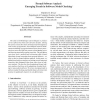Free Online Productivity Tools
i2Speak
i2Symbol
i2OCR
iTex2Img
iWeb2Print
iWeb2Shot
i2Type
iPdf2Split
iPdf2Merge
i2Bopomofo
i2Arabic
i2Style
i2Image
i2PDF
iLatex2Rtf
Sci2ools
129
click to vote
ICSE
2007
IEEE-ACM
2007
IEEE-ACM
Formal Software Analysis Emerging Trends in Software Model Checking
The study of methodologies and techniques to produce correct software has been active for four decades. During this period, researchers have developed and investigated a wide variety of approaches, but techniques based on mathematical modeling of program behavior have been a particular focus since they offer the promise of both finding errors and assuring important program properties. The past fifteen years have seen a marked and accelerating shift towards algorithmic formal reasoning about program behavior - we refer to these as formal software analysis. In this paper, we define formal software analyses as having several important properties that distinguish them from other forms of software analysis. We describe three foundational formal software analyses, but focus on the adaptation of model checking to reason about software. We review emerging trends in software model checking and identify future directions that promise to significantly improve its cost-effectiveness.
Formal Software Analyses | Formal Software Analysis | Foundational Formal Software | ICSE 2007 | Software Engineering |
Related Content
| Added | 09 Dec 2009 |
| Updated | 09 Dec 2009 |
| Type | Conference |
| Year | 2007 |
| Where | ICSE |
| Authors | Matthew B. Dwyer, John Hatcliff, Robby, Corina S. Pasareanu, Willem Visser |
Comments (0)

